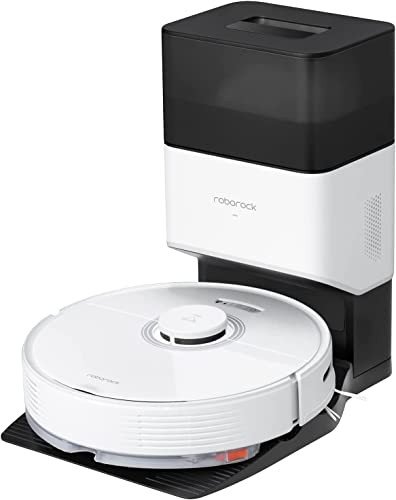Robotic Vacuum: A Simple Definition
The Rise of the Robotic Vacuum Cleaner: Revolutionizing Home Cleaning
In the realm of household devices, robotic vacuum have emerged as one of the most substantial developments recently. These autonomous gadgets offer benefit and efficiency, enabling homeowners to keep cleaner living areas without the drudgery of manual vacuuming. mop and vacuum robot out the advancement, functionality, advantages, and considerations concerning robotic vacuum, together with offering insights through data tables and regularly asked concerns.
A Brief History of Robotic Vacuum Cleaners
The journey of robotic vacuum began in the late 20th century, with early models stopping working to make considerable strides in homes. However, improvements in innovation led to the intro of more refined designs in the early 2000s. Business such as iRobot and Neato played an essential function in promoting these smart home devices.
Development Timeline of Robotic Vacuum Cleaners
Year
Milestone
1996
Launch of the very first robotic vacuum, the ELECTROLUX TRINITY
2002
iRobot presents the Roomba, a widely acknowledged model
2012
Introduction of designs with innovative mapping abilities
2020
Incorporation of expert system for boosted navigation
2023
Models with incorporated clever home connectivity and app control
How Robotic Vacuum Cleaners Work
Robotic vacuum utilize a mix of sensing units, mapping technology, and synthetic intelligence to navigate and clean various surfaces successfully. Here's a streamlined overview of their core functionality:
Sensors: Equipped with infrared or ultrasonic sensors, these devices can discover obstacles, cliffs, and dirt, enabling them to browse through rooms without crashing into furniture or tumbling down stairs.
Navigation: Most modern-day robotic vacuum integrate clever mapping innovations, allowing them to map out the home layout and enhance cleaning courses.
Cleaning Mechanism: Using brushes and suction power, robotic vacuums collect dirt, dust, and debris from different floor types, consisting of carpets and hardwood.
Charging and Cleaning Schedules: After finishing a cleaning session or when their battery runs low, these robotics instantly go back to their charging dock. Users can set cleaning schedules through mobile phone apps, helping preserve a tidy home easily.
Benefits of Robotic Vacuum Cleaners
Robotic vacuum cleaners use numerous advantages over standard vacuuming methods. Here are a few of the key advantages:
- Time-Saving: Automated cleaning suggests house owners can designate their time to other activities.
- Convenience: Scheduling cleaning sessions enables a clean home without manual intervention.
- Thorough Cleaning: Many robotic models come with specialized brushes to tackle family pet hair and supply deep cleaning on carpets and rugs.
- Smart Home Integration: Many units are compatible with smart home systems, offering voice control and remote management.
Popular Features in Robotic Vacuum Cleaners
Function
Description
Mapping Technology
Creates a digital map of the cleaning area
Mobile App Control
Supplies users the ability to start/stop or schedule cleaning sessions from another location
Self-Cleaning
Some designs have docking stations that can self-empty dust bins
Advanced Sensors
Discovers dirt more effectively and browses better
Voice Control
Suitable with virtual assistants like Alexa and Google Assistant
Considerations Before Purchasing a Robotic Vacuum Cleaner
While robotic vacuum use numerous advantages, possible buyers need to think about a couple of factors before making a purchase. Here are some points to keep in mind:
Key Factors to Evaluate
Floor Type: Certain models carry out much better on carpets while others stand out on hard floors. Purchasers ought to pick versatile vacuums if they have actually mixed floor covering.
Battery Life: Longer battery life permits extended cleaning sessions. Look for designs that can cover large locations without regular charging.
Dustbin Capacity: A bigger dustbin lowers the frequency of emptying, making cleaning less labor-intensive.
Sound Level: Some models operate quietly, which is perfect for homes with babies or sensitive animals.
Upkeep: Users ought to also examine the ease of maintenance, specifically for filters and brushes.
Potential Drawbacks
- Rate: Robotic vacuum can be substantially more expensive than conventional vacuums.
- Effectiveness: While they efficiently maintain tidiness, they may not always match the deep cleaning efficacy of manual vacuums.
- Challenge Navigation: Some models might have problem with particular kinds of furnishings or chaotic locations, possibly resulting in missed out on areas.
Frequently Asked Questions About Robotic Vacuum Cleaners
Q1: How frequently should I run my robotic vacuum cleaner?
A1: It usually depends on your family. For homes with family pets or high foot traffic, running it daily is beneficial. In less active homes, you may find every other day is adequate.
Q2: Can robotic vacuum work on carpets?
A2: Most robotic vacuums can clean carpets; nevertheless, functions such as suction power and brush design can considerably affect their efficiency on different carpet types.
Q3: Are robotic vacuum good for family pet hair?
A3: Yes, numerous models are specifically designed to pick up pet hair and feature specialized brushes to avoid tangling.
Q4: What occurs when the vacuum lacks battery?
A4: Most robotic vacuums automatically return to their charging dock when their battery is low, guaranteeing they are prepared for the next cleaning session.
Q5: Can I manage my robotic vacuum with my mobile phone?
A5: Yes, numerous robotic vacuum cleaners come geared up with mobile apps that permit you to arrange cleanings, display development, and get alerts.
Robotic vacuum represent a substantial improvement in home-cleaning technology, combining benefit with effectiveness to basically change how families keep cleanliness. As innovations continue to emerge, these devices are ending up being progressively capable, using users not just time-saving solutions however likewise enhanced cleaning experiences. As the marketplace continues to grow, potential buyers are motivated to weigh the functions, advantages, and considerations carefully to find the best model tailored to their special needs. Whether it's a busy family, a pet fan, or somebody looking for automation in their cleaning routine, there's likely a robotic vacuum cleaner that fits the costs.
